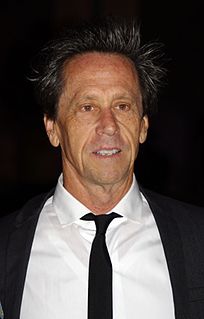Top 59 Quotes & Sayings by Brian Grazer
Explore popular quotes and sayings by an American producer Brian Grazer.
Last updated on April 19, 2025.
Being interested in other fields and meeting experts outside entertainment - whether it's a two-hour conversation with John Nash that turns into 'A Beautiful Mind' or talking to people in architecture or fashion, CIA directors or Nobel laureates - has given me a better sense of which ideas feel authentic and new.
I like learning stuff. The more information you can get about a person or a subject, the more you can pour into a potential project. I made a decision to do different things. I want to do things that have a better chance of being thought of as original. I do everything I can to disrupt my comfort zone.
I went to USC. I wasn't a rich kid or anything like that, so I had to get a scholarship. Went to USC; my first year, I took 26 units, so I got to have a nickname. Everyone goes, 'There's 26.' So I had a nickname. Having a nickname is a good thing because then you start to get popular, and you keep that going.
We're interested in complex characters and he's a complex character, [J. Edgar] Hoover. I like these types of dramas. I've made a few of them and I'm also interested in power structures so it just has elements that fascinate me, and the more you learn about Hoover, the more polarizing you realize he is.




















